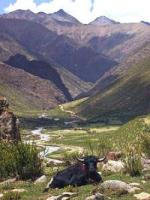While it’s impossible to attach a current economic value, Tibet’s most important export arguably is water. Twenty per cent of the world’s population depend for fresh water on one of four great rivers that originate on the Tibetan plateau.
Given that fact, the world should be concerned that, as New Scientist magazine reported this week: “The Tibetan plateau is heating up by 0.3°C each decade, more than twice the worldwide average, according to a new study from the Tibet Meteorological Bureau”
Where climate change is concerned, too many people have taken reassurance from the small numbers and long time frames that always seem to define global warming predictions: 0.3°C each decade, for example.
But if faster melting means that the torrential rivers that now burble out of Tibet’s great glaciers start to flow more quickly, the downstream devastation could be severe. And if those glaciers melt completely – as they are predicted to do by 2035 – there are huge risks that those rivers will slow, or dry up all together, in the hot summers on the Chinese and Indian plains.
It’s time people stopped taking refuge in the climate change averages and start contemplating the likely results of the increasing climate extremes. That’s NOT an extremist position; it is modestly prudent – the least we should expect of the world’s leaders.
Subscribe to our newsletter
Stay up to date with DeSmog news and alerts






